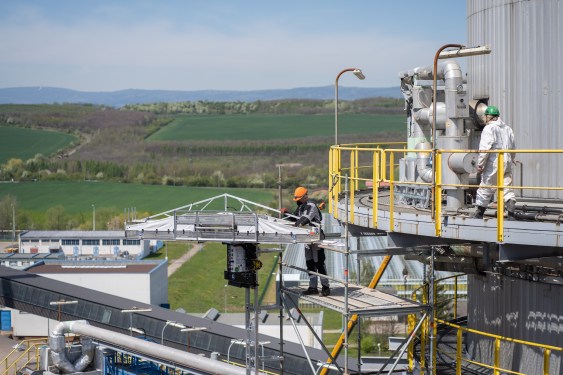The Case for Automation in Construction
Construction is one of the world’s biggest industries, but it’s also among the most expensive and often dangerous. It checks off the three Ds (dull, dirty, and dangerous) of automation quite plainly. Despite this, automating construction makes plain sense on the face of it.
Meet Kewazo: Disrupting the Construction Industry
We encountered Kewazo several years back when the Munich-based startup participated in a TC Sessions: Robotics pitch-off. Sometimes startups take a lot of explaining off the bat, but this isn’t one. At the center of the offering is the firm’s first product, Liftbot.
What is Liftbot?
Liftbot is effectively an automated hoist system that ascends and descends scaffolding systems. It takes two workers around 20 minutes to install (per the company), is fully battery powered and wireless, and is able to arrive at its destination without manual interference.
The Pandemic Catalyst
Kewazo got a nice boost during the pandemic, as construction reopened, but many companies suddenly had trouble filling roles. Co-founder and CEO Artem Kuchukov tells TechCrunch that despite already existing labor shortages, "it became impossible for foreign workers to commute back to their home countries and come back." Many sites in Europe, the Middle East, and Singapore massively suffered from this, as a large percentage of their workforce simply wasn’t there anymore.
The $10M Series A
Today Kewazo is announcing a $10 million Series A. The round, which brings its full fundraising up to around $20 million, was led by Fifth Wall, with participation from Cybernetix Ventures, Unorthodox Ventures, and Nemetschek. It follows a $5 million "Pre-Series A" back in September 2021.
Bart Gyssels on Kewazo
"I think it is very useful that companies like Kewazo are disrupting our business," says Bart Gyssels, CIO of Altrad Services Benelux. "We will have problems in finding and keeping good personnel — this will be our main focus in the coming years and decades. These innovations are very helpful in attracting and motivating our coworkers and help us to provide our customers with cost-effective and safe services."
Raising Capital in 2022
Kuchukov tells TechCrunch that, in spite of general bullishness around construction automation, raising in 2022 was no walk in the park. "Series A in 2022 was tougher though," he says. "We started fundraising at the beginning of April, right when things started to slow down." Despite this, Kewazo decided not to rely on the unstable economic situation and pushed forward with their plans.
Plans for the Money
Among the plans for the money is an increase in headcount. Kewazo currently employs 26 full-time and 11 part-time employees and plans to hire another 15 this year, largely in business and product development.
Why Construction Automation Matters
Construction automation has been gaining traction in recent years, but it’s clear that there are still many challenges to be overcome. Kewazo’s success is a testament to the potential of construction robotics to transform the industry.
- Safety: Automated systems can reduce the risk of accidents and injuries on construction sites.
- Efficiency: Robots can work around the clock without fatigue, increasing productivity and reducing labor costs.
- Quality: Automated systems can ensure consistency and precision in construction, reducing errors and rework.
- Environmental Impact: By reducing waste and energy consumption, construction automation can help mitigate the environmental impact of building projects.
The Future of Construction
As the industry continues to evolve, it’s clear that construction automation will play an increasingly important role. With companies like Kewazo leading the charge, we can expect to see significant advancements in the field in the coming years.
Conclusion
Kewazo’s $10M Series A is a significant milestone for the company and a testament to the potential of construction robotics to transform the industry. As the world continues to urbanize and infrastructure development accelerates, it’s clear that automation will play an increasingly important role in shaping the built environment.
With Kewazo at the forefront, we can expect to see exciting innovations and advancements in construction automation in the years to come.




